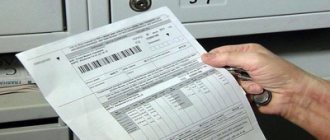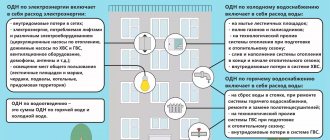What utilities do I need to pay for?
The general concept of public services is understood as the provision of certain services that are used by residents of the premises, namely:
- Water supply services: cold and hot water;
- sewerage (water disposal);
- electricity supply services;
- Gas supply services, if such a resource is used;
- Heating services in winter;
- Solid waste removal services;
- Elevator operation.
You also need to pay for the maintenance of the entire house:
- current repairs of common areas;
- cleaning stairs, elevators, areas near apartments;
- maintenance of intercom and entrance doors;
- maintenance of general building communications;
- cleaning the local area;
- roof maintenance and repair;
- other similar works.
Payment is made to the accounts of resource or service providers at tariffs established by the state. All residents, without exception, are required to pay, and the rates do not depend on who is the owner of the property.
The list of utility services is approved by Article 154 of the Housing Code of the Russian Federation.
If there is an HOA in the house, then most likely the residents are obliged to pay the labor of the employees of this organization. For this purpose, mandatory contributions in a certain amount are introduced.
About the possibility of disconnecting from central heating.
Part 15 of Art. 14 of the Federal Law of July 27, 2010 No. 190-FZ “On Heat Supply”, the transition to heating residential premises in apartment buildings using individual apartment sources of thermal energy is prohibited if there is a connection (technological connection) carried out in the proper order to the heating supply systems of houses (the exception applies only to cases , determined by the heat supply scheme). Prohibited individual residential sources of thermal energy include sources of thermal energy running on natural gas that do not meet the following requirements (clause 44 of the Rules for connecting to heat supply systems):
- the presence of a closed (sealed) combustion chamber;
- the presence of automatic safety equipment that ensures that the fuel supply is stopped when the electrical power supply is stopped, the protection circuits are faulty, the burner flame goes out, the coolant pressure drops below the maximum permissible value, the maximum permissible coolant temperature is reached, as well as in the event of a violation of smoke removal;
- coolant temperature – up to 95 °C;
- coolant pressure – up to 1 MPa.
Thus, a legal transition to heating using an individual apartment source of thermal energy (for example, a gas boiler) in apartments in apartment buildings is still possible, but subject to the above requirements, as well as in the presence of a heat supply scheme that provides for this possibility.
The development of the heat supply system of a settlement or urban district is carried out on the basis of a heat supply scheme, which must comply with the territorial planning documents of the settlement or urban district, including the scheme of the planned location of heat supply facilities within the boundaries of the settlement or urban district. The development, approval and annual updating of heat supply schemes is the domain of the authorized bodies. Heat supply schemes for settlements, urban districts with a population of 500,000 people or more, as well as cities of federal significance are approved by the federal executive body authorized to implement state policy in the field of heat supply (clause 11, part 2, article 4 of Federal Law No. 190-FZ ). In settlements and urban districts with a population of less than 500,000 people, this is done by local government bodies (clause 6, part 1, article 6).
In addition, according to paragraphs. “c” clause 35 of the Rules for the Provision of Public Utilities, the consumer does not have the right to arbitrarily dismantle or turn off the heating elements provided for in the design and (or) technical documentation for the MKD, or to arbitrarily increase the heating surfaces of heating devices installed in a residential premises above the parameters determined by the design and ( or) technical documentation for the house.
One example where judges considered it legal to switch to heating using individual residential heat sources is case No. A74-4772/2016. Electric heating devices are not included in the list of prohibited use for heating residential premises in apartment buildings provided that the heating devices are properly connected to the heat supply systems. The possibility of installing them in an apartment complies with the submitted design documentation, technical specifications, does not violate the rights and legitimate interests of citizens, and does not create a threat to their life and health (see Resolution of the AS VSO dated 04/05/2017 No. F02-1114/2017).
In case No. A55-26533/2015, the judges emphasized: it is impossible to completely disconnect a residential apartment from centralized heating. Owners of residential premises must provide a technically sound solution to the issues of heating common areas and locations (including basements, subfloors) of general house communications (collectors and risers of sewerage systems, cold water supply), provided for in accordance with the MKD project, taking into account the functioning of the intra-house heating system connected to a centralized heating system. In turn, an increase in natural gas consumption entails the need to conduct a technical calculation of the capacity of existing gas pipelines (external and internal) and determine the cost of work on preparing gas networks, as well as obtaining permission to increase the volume of natural gas use from the gas supply organization.
As a result, the transition to heating residential premises in apartment buildings using individual sources of thermal energy is possible after the following conditions are met:
- consent of all owners of premises in the house to disconnect (disconnect) the house from the central heating system and install individual (apartment) heating systems;
- adjustment of the urban district's heat supply scheme;
- obtaining technical conditions for connecting a new gas-using appliance (boiler) from the gas supply organization;
- development by a specialized organization of a project (projects) for the reconstruction of an in-house heating system, taking into account the heating of common areas;
- carrying out work on dismantling the general intra-house heating system and installing individual (apartment) heating systems for all premises simultaneously during the non-heating period.
Note:
judges are discussing the possibility of switching to individual heating of apartment buildings as a whole, rather than individual apartments (see Resolution of the AS PO dated February 16, 2017 No. F06-17561/2017 in case No. A55-26533/2015).
At one time, the Supreme Court of the Russian Federation, in its Decision dated May 7, 2015 No. AKPI15-198, indicated that the ban established by Part 15 of Art. 14 of Federal Law No. 190-FZ, was introduced in order to maintain the heat balance of the entire residential building, since when switching to individual heat supply for at least one apartment in an apartment building, the temperature in the adjacent rooms decreases and the hydraulic regime in the intra-house heat supply system is disrupted.
And the Ministry of Construction in Letter No. 22588-OD/04 dated October 15, 2014 added: the procedure for switching to heating residential premises in apartment buildings using individual apartment sources of thermal energy is quite complex and expensive, it is more expedient to carry out such a transition in relation not to a separate residential premises, but to apartment buildings generally.
Tenant expenses
The tenant's expenses when renting housing under a lease agreement consist of:
- Rent for the housing provided;
- Payment of utility services.
But in practice, many tenants refuse to pay for utilities. In this situation, you need to refer to the lease agreement; if it does not stipulate the terms of payment for utilities, then the owner must pay for them himself. Therefore, if the owner of the apartment wants the tenant to pay for utilities, then this clause must be included in the contract.
How to find good tenants: selection tips
Owners of rental apartments put forward certain requirements to future tenants. Most often, the list of required qualities includes:
- responsibility;
- cleanliness;
- solvency.
Often the list is expanded with additional items, for example, the absence of children and pets. But is it possible to immediately understand what kind of tenant the tenant will be? Useful tips will help you find the perfect tenant and make the right choice:
- The relationship between the property owner and future tenants should be sealed with a formal contract. The more detailed and understandable the document, the greater the chance of avoiding problems in the future.
- Connecting a third party - a rental agent - allows you to receive additional guarantees and benefits.
Important. An experienced specialist knows how to properly search for tenants, what questions to ask them, how to arrange an inspection, and draw up an agreement that takes into account all the nuances. - Clarify all important aspects “on shore” before concluding agreements. This will make it possible to clarify controversial issues before they arise, and in case of irreconcilable views, simply refuse applicants.
- It is important to maintain friendly relations, but not to turn them into friendly ones. Close communication with the tenant can lead to certain difficulties - delay in payment, ignoring previously agreed rules, etc.
There is a widespread opinion among landlords that it is best to look for tenants through people they know, but practice does not confirm this theory.
If you strictly adhere to these rules, you can reduce possible problems to a minimum and find responsible people even through a simple advertisement on a bulletin board or in a newspaper.
What utilities must the tenant pay?
The tenant must pay for utilities, which are provided to him by the relevant companies.
The list of utilities depends on the engineering equipment of the housing with communications.
Let's look at the main list of utilities:
| Payment for water supply | If the apartment does not have a meter installed, then the amount of payment depends on the number of registered people and on the rate of water provided per person per day. |
| Payment for heating | The payment amount depends on the area of the apartment |
| Garbage removal | It also depends on the number of registered people in the apartment and the norm for 1 person. |
| Payment for gas supply | If the house is gasified and meters are not installed, then the amount of the receipt is calculated according to the number of registered people and according to the rate per person per month |
| Payment for electricity supply | A meter must be installed in the apartment, and its readings must be provided to the company providing the service on a monthly basis. The amount depends on the amount of resource used. |
All utilities must be paid on time. Payment deadlines are indicated on utility bill receipts.
If payment is not made, then companies can take the following measures:
- Limit the supply of resources;
- Stop the complete supply of the resource;
- Accrual of penalties.
Methods of paying utility bills when renting out housing under a lease agreement
When renting out housing under a lease agreement, utility bills can be paid in three ways:
- Utility bills are paid by the tenant. In addition to rent, he also pays utility bills. But there is a risk that the tenant may not pay, the debt will grow and the property owner will have to pay for everything himself.
- Utility bills are paid by the owner himself. In this case, the tenant pays only the rent, and the owner pays for utilities at his own expense.
- Utilities are included in the rent. In this situation, the tenant pays rent in a fixed amount, which already includes the amount for utilities and the owner pays these payments himself.
- Compensation for utility bills is when the tenant pays a separate payment for utility bills to the owner of the property.
Important!!! To avoid any misunderstanding between the tenant and the owner regarding payment of utility bills, this clause must be written down in the lease agreement. And be sure to indicate the payment method.
Advantages and disadvantages of each type of payment for utility services
| Type of payment | pros | Minuses |
| Utility payments are included in the rental price | The tenant knows exactly how much he will spend for the apartment; | The tenant does not save resources; |
| The owner independently controls the payment of utility bills; | The owner spends personal time paying utility bills for rented housing; | |
| Both parties may not meet every month, but transfer the rent to the landlord's account; | The tenant may feel that they are being overcharged because they have no control over paying their bills; | |
| When tariffs for housing and communal services increase, the owner of the apartment can increase the rent, but no more than once a year. | In winter, housing and communal services tariffs usually increase; this must be taken into account. | |
| The tenant pays their own bills | The homeowner does not spend personal time paying bills; The homeowner's income will be stable; The tenant will be able to control the resources used. | The owner of the property needs to constantly monitor payment of utilities, and meet with the tenant every month to collect payments; There is a risk that the tenant will not pay utilities; In winter, apartment expenses will increase significantly. |
| Compensation for utility bills separately | Transparency of relationships: each party knows not to spend more money than expected; The homeowner is confident in paying utility bills; The owner's income is fixed; Tenants can save money by conserving resources. | The owner of the property will have to come for money in order to pay utility bills; The lease agreement will indicate that the amount varies - this is not beneficial when paying taxes. |
Neighbors flooded
Who should pay: the culprit of the flooding.
Such cases are regulated by the Civil Code (clause 1 of Article 1064 of the Civil Code of the Russian Federation). Damage caused to property is compensated by the culprit (by the way, the same applies to situations where the tenant drowns his neighbors).
“This culprit may be a neighbor from above, a management organization (if, say, a common building riser burst) or other persons (they are determined by the court). If the flood occurred due to the fault of the tenant who did not turn off the water tap, then the damage will have to be compensated to him. And if the tap was torn off because it was rusty, or the flooding occurred due to a leak in the pipes, then the owner is responsible for this. At the same time, the owner of the property himself will sort out with the management company (MC) who exactly is to blame for the flooding: he or the management company, which did not carry out timely repairs to the internal communications,” clarifies Pyotr Gusyatnikov. Thus, in case of flooding, the conflict arises not between the tenant and the owner, but between the owner and the one who flooded the apartment.
What should a tenant do if he is not to blame for the flooding?
First of all, it is necessary to minimize damage to property. To do this, according to Pyotr Gusyatnikov, you need:
- cut off power to a flooded room;
- shut off the water risers, go up to your neighbors and ask them to do the same. If there are no neighbors or these actions did not help, then call the emergency service yourself;
- Call the owner immediately and report the incident. If it was not possible to contact the owner of the apartment, then the tenant will have to continue solving the problem.
After eliminating the cause of the leak, but no later than 12 hours from the moment of contacting the dispatch service, you need to call the management company employees to inspect the scene of the incident and draw up a report on the flood.
“It is better if this is done in the presence of the neighbors who flooded you and other witnesses. The document is drawn up in any form; it must describe the damage caused and the circumstances under which it occurred. Also, the owner or neighbors can call their appraisal organization, but this does not negate the fact that there must be an act from the management company,” emphasizes Pyotr Gusyatnikov, senior managing partner of the law firm PG Partners.
You should also photograph or videotape all the consequences of the flood, the lawyer advises. The owner and neighbors can then try to resolve the dispute amicably and agree on compensation. If they fail, they will have to go to court.








